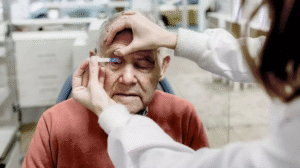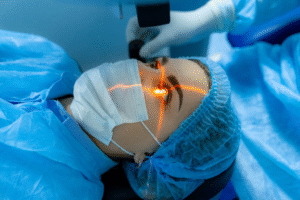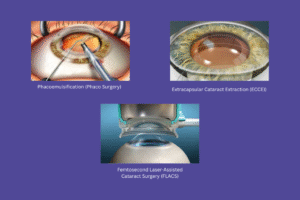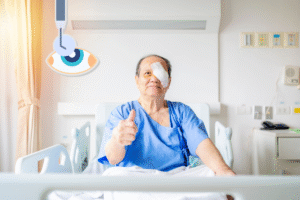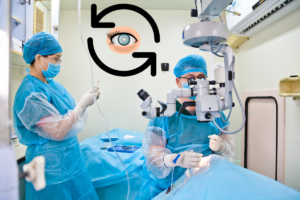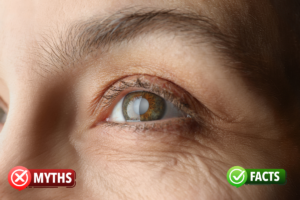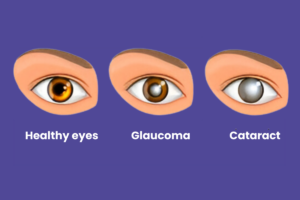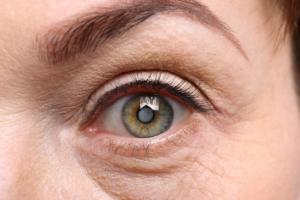Best sleeping positions after cataract surgery

Cataract surgery is a quick and effective procedure that restores clear vision. However, proper post-surgery care is crucial to ensure a smooth recovery. One of the most overlooked aspects of recovery is how you sleep after cataract surgery. Your sleeping position can impact healing, reduce discomfort, and help prevent complications. In this guide, we’ll discuss the best sleeping positions, precautions, and tips for a safe and comfortable recovery.
Table of Contents
ToggleWhy does sleeping position matter after cataract surgery?
After cataract surgery, your eye is in a delicate state as it heals. Incorrect sleeping positions can:
- Put pressure on the operated eye, increasing the risk of complications.
- Dislodge the protective eye shield, which is meant to protect against accidental rubbing or external irritants.
- Delay healing and cause discomfort, especially if you sleep on the side of the operated eye.
Best sleeping positions for faster healing after cataract surgery
1. Sleeping on your back (Highly recommended)

Sleeping on your back is the best position after cataract surgery because:
- It prevents direct pressure on the operated eye.
- It reduces the risk of accidentally rubbing your eye while sleeping.
- It allows proper blood circulation, promoting healing.
2. Sleeping on the opposite side (If necessary)

If you are not comfortable sleeping on your back, you can sleep on the opposite side of the operated eye. For example, if your right eye was treated, sleep on your left side. This helps:
- Minimize pressure on the healing eye.
- Reduce discomfort while resting.
Positions to avoid after cataract surgery
1. Sleeping on the operated side (Not recommended)

- This puts direct pressure on the eye and can disrupt healing.
- There’s a risk of accidentally rubbing or irritating the eye.
- It may cause swelling or discomfort.
2. Sleeping face down (Strictly avoid)

- Can increase swelling around the eye.
- May increase pressure inside the eye, which is harmful for recovery.
- Increases the risk of infection if bacteria from bedding come into contact with the eye.
Tips for a safe & comfortable sleep after cataract surgery
1. Use a protective eye shield
Your doctor will provide an eye shield to wear while sleeping, usually for the first 1-2 weeks. This prevents accidental rubbing and protects against dust or particles.
2. Keep your head slightly elevated
Using an extra pillow to keep your head elevated can help:
- Reduce swelling and fluid buildup.
- Promote better circulation for faster healing.
- Minimize discomfort while sleeping.
3. Avoid sleeping on soft, deep pillows
- Soft pillows may cause your head to sink, leading to unintended pressure on the eye.
- Use a firm pillow that provides proper support.
4. Create a sleep-friendly environment
- Use clean pillowcases and bed linens to prevent infections.
- Keep your room dark and quiet to promote restful sleep.
- Avoid sleeping near pets that might disturb you or accidentally touch your eye.
5. Take prescribed eye drops before bedtime
- This helps prevent dryness and infection.
- Follow your doctor’s schedule for post-surgery medications.
How long should you follow these sleeping guidelines?
Most doctors recommend following these sleep precautions for at least one to two weeks after cataract surgery. However, if your doctor advises otherwise, always follow their specific instructions.
Conclusion
Proper sleeping positions after cataract surgery are essential for a smooth recovery and optimal healing. The best approach is to sleep on your back or on the opposite side of the operated eye while using an eye shield for protection. Following these precautions can help you recover faster and enjoy clearer vision without complications.
If you are considering cataract surgery or need expert eye care, Krisha Eye Hospital is here to help. Our team of specialists is dedicated to providing top-quality eye treatments for a clearer, healthier vision.
Author bio
Dr. Dhwani Maheshwari, an esteemed ophthalmologist with over 10 years of experience, leads Krisha Eye hospital in Ahmedabad with a commitment to advanced, patient-centered eye care. Specializing in cataract and refractive surgery, Dr. Maheshwari has performed more than a thousand successful surgeries. Her expertise lies in phacoemulsification, a technique recognized for its precision in cataract treatment.
Dr. Maheshwari’s educational journey includes an MBBS from Smt. NHL MMC, a DOMS from M & J Institute of Ophthalmology, and a DNB in Ophthalmology from Mahatme Eye Bank Eye Hospital, Nagpur. She also completed a fellowship in phacoemulsification at Porecha Blindness Trust Hospital, further enhancing her surgical skills. In addition to her work at Krisha Eye Hospital, Dr. Maheshwari serves as a consultant ophthalmologist at Northstar Diagnostic Centre.
Under her leadership, Krisha Eye Hospital aims to bring all superspecialties under one roof, offering comprehensive eye care solutions for all vision needs.
FAQs
The best sleeping position is on your back or on the side opposite to the operated eye to prevent pressure or accidental injury. Always wear the protective eye shield while sleeping and avoid sleeping on your stomach. If you experience discomfort, consult your eye surgeon for guidance.
No, you should keep the eye shield on for at least the first few nights to prevent accidental rubbing or external irritation.
It is best to wait at least one to two weeks before sleeping on the operated side. Always consult your doctor before changing sleeping positions.
Yes, sleeping on the operated eye can cause pressure, discomfort, or slow healing. It may also increase the risk of infections or displacement of the intraocular lens.
No, naps are fine, but make sure to wear your eye shield and avoid rubbing your eyes when waking up.
Wearing your protective eye shield and sleeping on your back helps minimize this risk.
If it happens once, don’t panic. However, if you feel discomfort or experience any unusual symptoms like pain, swelling, or blurry vision, contact your doctor immediately.
No, it is best to avoid sleep masks unless your doctor specifically recommends one. A sleep mask may press against the healing eye, causing discomfort or delaying recovery.
Yes, improper sleeping positions can increase the risk of complications, which may affect how quickly and effectively your vision improves.
Yes, sleeping in a recliner can be a good alternative, especially if it helps keep your head elevated and reduces pressure on your eye.
Most doctors recommend wearing the eye shield for at least one to two weeks while sleeping, but always follow your surgeon’s specific instructions.
It’s best to avoid heavy blankets near your face to prevent accidental pressure on your healing eye.
Yes, but avoid direct airflow towards your eyes to prevent dryness and irritation.
Yes, reducing caffeine intake can help you get restful sleep, which is essential for recovery.
Try using extra pillows to keep your head elevated and avoid putting pressure on your operated eye. If discomfort persists, consult your doctor.
It’s best to keep your head in a neutral or slightly elevated position to avoid unnecessary pressure on your eye.










